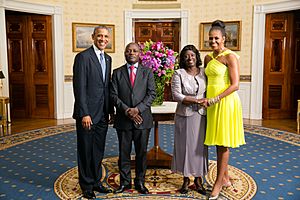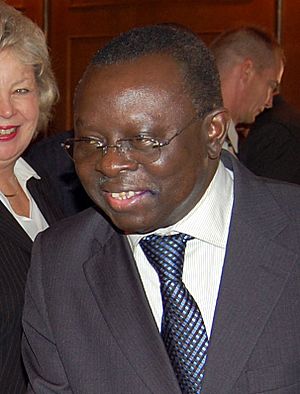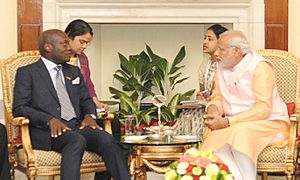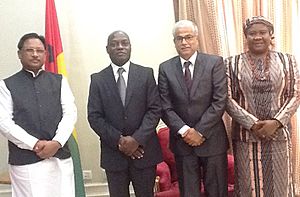José Mário Vaz facts for kids
Quick facts for kids
José Mário Vaz
|
|
|---|---|
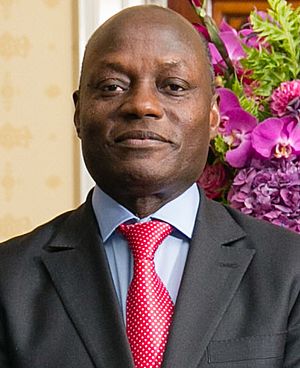
Vaz at the United States–Africa Leaders Summit 2014
|
|
| 5th President of Guinea-Bissau | |
| In office 23 June 2014 – 27 February 2020 |
|
| Prime Minister | Rui Duarte de Barros (Acting) Domingos Simões Pereira Baciro Djá Carlos Correia Baciro Djá Umaro Sissoco Embaló Artur Silva Aristides Gomes Faustino Imbali |
| Preceded by | Manuel Serifo Nhamadjo (Acting) |
| Succeeded by | Umaro Sissoco Embaló |
| Minister of Finance | |
| In office 8 September 2009 – 12 February 2012 |
|
| Preceded by | Issuf Sanhá |
| Succeeded by | Abubacar Demba Dahaba |
| Personal details | |
| Born | 10 December 1957 Calequisse, Portuguese Guinea |
| Political party | PAIGC |
| Spouse | Rosa Teixeira Goudiaby |
| Signature |  |
José Mário Vaz (born 10 December 1957) is a politician from Guinea-Bissau. He served as the president of Guinea-Bissau from June 23, 2014, to February 27, 2020.
Contents
Early Life and Education
José Mário Vaz is often called "Jomav" by people who know him. He was born in 1957 in a place called Calequisse, which is near the city of Cacheu in northern Guinea-Bissau. His parents were Mário Vaz and Amelia Gomes.
He is married to Rosa Teixeira Goudiaby and they have three children. José Mário Vaz studied economics in Lisbon, the capital of Portugal. In 1982, he also completed an internship at the Office of Economic Studies of the Banco de Portugal, which is Portugal's central bank.
Political Journey
José Mário Vaz began his political career in 2004. He was elected as the mayor of Bissau, which is the capital city of Guinea-Bissau. He held this important position until 2009.
In 2009, President Malam Bacai Sanhá chose him to be the Minister of Finance. This meant he was in charge of the country's money and economy. However, in 2012, there was a sudden change in government, and he and other ministers were removed from their roles.
Vaz is a member of a political group called the African Party for the Independence of Guinea and Cape Verde (PAIGC). In March 2014, he won a special vote within his party to become their candidate for president. He competed against eleven other people to get this chance.
Presidential Election 2014
The presidential election in Guinea-Bissau happened in two parts. In the first round, on April 13, 2014, José Mário Vaz received 40.9% of the votes. This meant he moved on to the second round.
In the second round, held on May 18, 2014, he ran against Nuno Gomes Nabiam. José Mário Vaz won with 61.9% of the votes. Even though Gomes Nabiam first disagreed with the results, he accepted them a few days later, on May 22, 2014.
During his election campaign, Vaz made promises to the people. He said he would work to make sure fewer people lived in poverty. He also promised to bring more money into the country to help with farming and other important areas. After the 2012 government change, he had gone to Portugal. He returned in February 2013 and was held for three days. He denied being involved in the disappearance of money that was given to the country as help from Angola.
Time as President
José Mário Vaz became the president of Guinea-Bissau on June 23, 2014. His inauguration marked the end of a temporary government that had been in place since the events of April 2012.
When he became president, Domingos Simões Pereira was the prime minister. During Vaz's time as president, there were some political challenges in the country. Efforts were made to solve these issues.
José Mário Vaz holds a special place in Guinea-Bissau's history. He is the only president since the country became independent who has completed his full five-year term in office.
The International Monetary Fund, a group that helps countries with their economies, met with President Vaz and other officials. They talked about how the country's economy was doing and plans for managing money, including a budget for 2018.
During his presidency, there were concerns about illegal activities in Guinea-Bissau. President Vaz was worried about how this might affect elections and his popularity. He met with ambassadors from the UN to discuss these issues.
Later, President Vaz removed the government from power, which caused another challenge for Guinea-Bissau, especially with an election coming up soon.
On June 27, 2019, just after his term was supposed to end, the assembly of Guinea-Bissau chose Cipriano Cassamá, the president of the National People's Assembly, to temporarily take his place. However, two days later, on June 29, a group of West African countries called ECOWAS decided that Vaz should stay in office until after the 2019 elections.
In the 2019 elections, Vaz ran as an independent candidate, meaning he was not representing a political party. He received 12% of the votes in the first round, which was not enough to move on to the second round of the election.
See also
 In Spanish: José Mario Vaz para niños
In Spanish: José Mario Vaz para niños
- Politics of Guinea-Bissau
 | Claudette Colvin |
 | Myrlie Evers-Williams |
 | Alberta Odell Jones |


